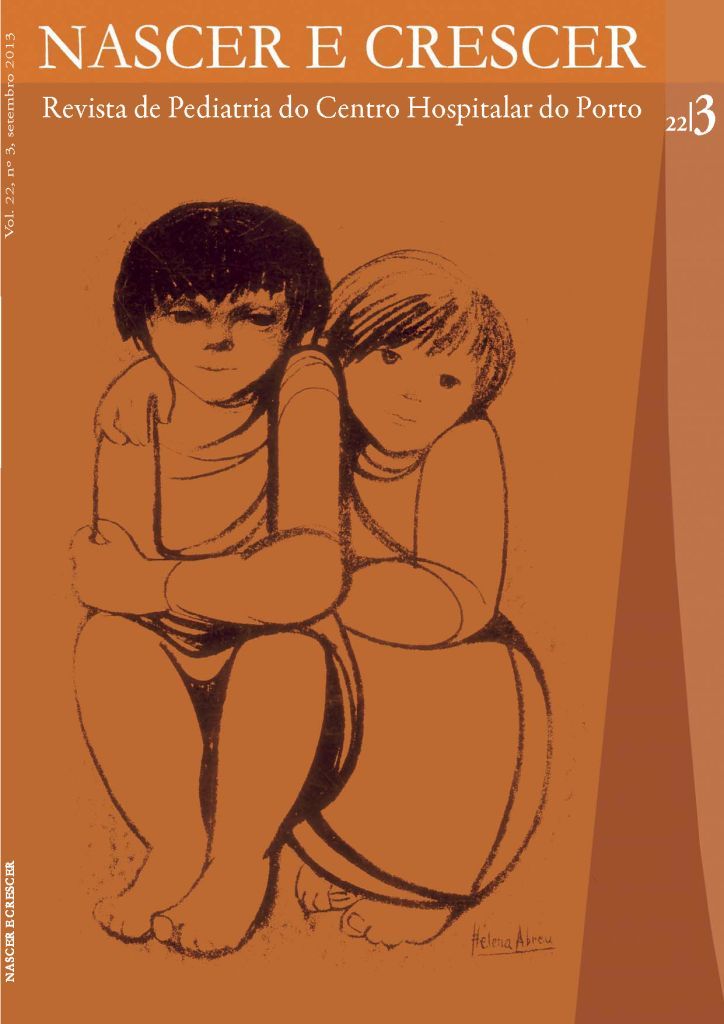Abordagem da má evolução ponderal
DOI:
https://doi.org/10.25753/BirthGrowthMJ.v22.i3.10647Palavras-chave:
Má evolução ponderal, avaliação nutricional, diagnóstico, tratamentoResumo
Introdução: A má evolução ponderal encontra-se entre um dos motivos mais frequentes de referenciação à consulta de Pediatria. As dificuldades encontradas na deÞ nição desta entidade e as diferentes abordagens desta situação tornam difícil uma homogeneização de critérios e atitudes.
Objetivo: Orientar a abordagem e seguimento das crianças com má evolução ponderal.
Métodos: Revisão de artigos pertinentes publicados sobre a designação de “má evolução ponderal”, “fallo de medro” ou “failure to thrive” usando as bases de dados Cochrane e Pubmed. Desenvolvimento: A maioria das causas de má evolução ponderal envolve uma ingestão calórica inadequada condicionada por problemas psicossociais e comportamentais. De facto apenas 5% das causas de má evolução ponderal podem ser atribuídas a patologia orgânica o que dificulta uma abordagem sistematizada destas crianças. Os exames complementares de diagnóstico na avaliação destas crianças contribuem muito pouco para o diagnóstico e não estão recomendados por rotina. O seguimento multidisciplinar destas crianças e suas famílias, idealmente com acompanhamento domiciliário, associado a uma otimização da ingestão alimentar mostrou-se eficaz no ganho ponderal e na melhoria da interação da criança com os cuidadores.
Conclusões: Uma identificação precoce desta situação associada a uma intervenção multidisciplinar que vise uma otimização da ingestão calórica minimiza as sequelas a longo prazo.
Downloads
Referências
Jaffe AC. Failure to Thrive: Current Clinical Concepts. Pediatr
Rev 2011; 32:100 -8.
Gahagan S. Failure to Thrive: A Consequence of Undernutrition.
Pediatr Rev 2006; 27:e1 -11.
Zenel JA. Failure To Thrive: A General Pediatrician’s Perspective.
Pediatr Rev 1997; 18:371 -8.
Wright CM, Weaver LT. Image or reality: why do infant size
and growth matter to parents? Arch Dis Child 2007; 92:98-
-100.
Hughes I. Confusing terminology attempts to deÞ ne the unde-
Þ nable. Arch Dis Child 2007; 92:97 -8.
Diéguez SV. Fallo de medro en lactante. BSCP Can Ped
; 29:103 -9.
Bauchner H. Failure to Thrive. In: Nelson Textbook of Pediatrics.
th Ed. Philadelphia, PA: WB Saunders; 2007.p.184 -7.
Merino AB, Romero CC. Protocolos diagnóstico -terapéuticos
de Gastrenterologia Hepatologia y Nutrición Pediátrica
SEGHNP -AEP. Actuación ante un niño con fallo de medro.
Disponível em: http://www.gastroinf.es/sites/default/Þ les/Þ les/
Protocolos%20SEGHNP.pdf
Conde AP, González BS. Fallo de medro. Bol Pediatr 2006;
:189 -99.
Bousoño -García C, Ramos E. Fallo de medro. An Pediatr
Contin 2005; 3:277 -84.
Ficicioglu C, Haack K. Failure to thrive: When to suspect inborn
errors of metabolism. Pediatrics 2009; 124:972 -9.
Mei Z, Grummer -Strawn L. Comparison of changes in Growth
Percentiles of US Children on CDC 2000 Growth Charts With
Corresponding Changes on Who 2006 Growth Charts. Clin
Pediatr (Phila) 2011; 50:402 -7.
Wright CM. IdentiÞ cation and management of failure to thrive:
a community perspective. Arch Dis Child 2000; 82:5 -9.
Wright CM, Parkinson KN, Drewett RF. The inß uence of maternal
socioeconomic and emotional factors on infant weight
gain and weight faltering (failure to thrive): data from prospective
birth cohort. Arch Dis Child 2006; 91:312 -7.
Connor K, Lennon R, McGraw ME, Coward RJM. A fair reason
for failing to thrive. Arch Dis Child Educ Pract Ed 2008;
:50 -7.
Chang SJ, Chae KY. Obstructive sleep apnea syndrome in
children: Epidemiology, pathophysiology, diagnosis and sequelae.
Korean J Pediatr 2010; 53:863 -71.
Krugman SD, Dubowitz H. Failure to Thrive. American Family
Physician 2003; 68:879 -84.
Emond A, Drewett R, Blair P, Emmett P. Postnatal factors
associated with failure to thrive in term infants in the Avon
Longitudinal Study of Parents and Children. Arch Dis Child
; 92:115 -9.
Olsen E, Skovgaard A, Weile B, Petersen J, Jorgensen T.
Risk factors for weight faltering in infancy according to age at
onset. Paediatr Perinat Epidemiol 2010; 24:370 -82.
Frisancho AR. New norms of upper limb fat and muscle
areas assessment of nutritional status. Am J Clin Nutr
:34:2540 -5.
Olsen EM, Petersen J, Skovgaard AM, Weile B, Jørgensen,
Wright CM. Failure to thrive: the prevalence and concurrence
of anthropometric criteria in a general infant population. Arch
Dis Child 2007; 92:109 -14.
Raynor P. Anthropometric indices of failure to thrive. Arch Dis
Child 2000; 82; 364 -5.
Sills RH. Failure to thrive: the role of clinical and laboratory
evaluation. Am J Dis Child 1978; 132:967 -9.
Spencer NJ. Failure to think about failure to thrive. Arch Dis
Child 2007; 92:95 -6.
Wright CM, Callum J, Birks E, Jarvis S. Effect of community
based management in failure to thrive: randomized controlled
trial. BMJ 1998; 317(7158):571 -4.
Corbett SS, Drewett RF. To what extent is failure to thrive
in infancy associated with poorer cognitive development? A
review and meta -analysis. J Child Psychol Psychiatry 2004;
:641 -54.
Black MM, Dubowitz H, Krishnakumar A, Starr RH Jr. Early intervention
and recovery among children with failure to thrive:
follow -up at age 8. Pediatrics 2007; 120:59 -69.
Rudolf MC, Logan S. What is the long term outcome for children
who fail to thrive? A systematic review. Arch Dis Child
; 90:925 -31.
Downloads
Publicado
Como Citar
Edição
Secção
Licença
Copyright e Direitos dos Autores
Todos os artigos publicados na Revista Nascer e Crescer – Birth and Growth Medical Journal são de acesso aberto e cumprem os requisitos das agências de financiamento ou instituições académicas. Relativamente à utilização por terceiros a Nascer e Crescer – Birth and Growth Medical Journal rege-se pelos termos da licença Creative Commons "Atribuição - Uso Não-Comercial - (CC-BY-NC)"".
É da responsabilidade do autor obter permissão para reproduzir figuras, tabelas, etc. de outras publicações.
Juntamente com a submissão do artigo, os autores devem enviar a Declaração de conflito de interesses e formulário de autoria. Será enviado um e-mail ao autor correspondente, confirmando a receção do manuscrito.
Os autores ficam autorizados a disponibilizar os seus artigos em repositórios das suas instituições de origem, desde que mencionem sempre onde foram publicados e de acordo com a licença Creative Commons.


